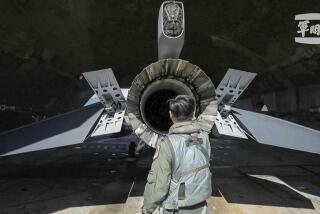Bush Clears Way for China Satellite Deal
- Share via
WASHINGTON — President Bush, taking two major steps toward improving relations with Beijing, cleared the way Tuesday for American-made satellites to be launched in China and for a continuation of loans from the U.S. Export-Import Bank to China.
In both cases, the President overrode objections by Congress and invoked his personal authority to approve the transactions. The actions came less than two weeks after Brent Scowcroft, Bush’s national security adviser, and Deputy Secretary of State Lawrence S. Eagleburger made a controversial visit to Beijing to meet with Chinese leaders.
The economic benefits to China are large. U.S. officials say there are $437 million in loans pending from the U.S. Export-Import Bank to China, which would have been held up if Bush had not given his approval.
The launch of American-built satellites, which are made by the Hughes Aircraft Co., will also mean hundreds of millions of dollars for China. However, White House Press Secretary Marlin Fitzwater emphasized that the satellite deal will produce income for American companies as well.
“The sale of three satellites represents approximately $300 million of business for U.S. firms,” he said.
In a written statement, Fitzwater said the Administration’s approval of export licenses for the three American satellites “is in keeping with the President’s policy not to disrupt normal commercial relations with China.”
This fall, after the violent suppression in June of pro-democracy demonstrations in Beijing, Congress passed two laws prohibiting the export of satellites for launch in China and holding up loans from the Export-Import Bank to China.
Both laws gave Bush authority to go ahead if he declared that these transactions were “in the national interest.” The President did so Tuesday in both cases.
Hughes Aircraft is not selling its telecommunications satellites directly to China. Rather, the buyers are Aussat, an Australian government-controlled corporation, and Asiasat, a private consortium based in Hong Kong.
Both Asiasat and Aussat have arranged to have their satellites launched on China’s Long March rockets. Australian officials have lobbied hard for the satellite deal, arguing that it is much cheaper to have the satellites launched inside China than anywhere else.
In announcing Bush’s approval for the export of the satellites, Fitzwater also emphasized the importance of the deal to the Australian government.
“Australia is a good friend and an important ally of the United States,” he said. “. . . The United States should maintain is reputation as a reliable supplier for the Australian government and the Asiasat consortium.”
The Reagan Administration had given preliminary approval for the export of the satellites last year, only a few days after Chinese leaders assured then-Defense Secretary Frank C. Carlucci that they would curb efforts to sell intermediate-range missiles to other countries, such as Syria. Last week, following Scowcroft’s mission to Beijing, the Chinese regime repeated these assurances.
More to Read
Sign up for Essential California
The most important California stories and recommendations in your inbox every morning.
You may occasionally receive promotional content from the Los Angeles Times.













